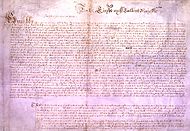Ship money facts for kids
Ship money was a special tax used in England a long time ago, from the Middle Ages until the mid-1600s. It was usually collected from people living near the coast to help pay for ships. English kings could often collect this tax using their own special powers, without needing permission from Parliament.
However, King Charles I started collecting ship money in 1634, even when there was no war. He also made people in inland areas pay it, not just those by the sea. This made many people, especially wealthy landowners, very angry. Their complaints about this tax were a big reason for the start of the English Civil War.
Contents
How Ship Money Used to Work
Long ago, kings like the Plantagenet rulers had the right to ask towns and counties near the sea to provide ships during wartime. Sometimes, instead of ships, they would ask for money.
Even though laws made by kings like Edward I and Edward III said that the king couldn't collect taxes without Parliament's approval, the power to ask for ship money during war never completely disappeared. For example, in 1619, James I collected ship money from London and other port towns, and people didn't really object.
Why People Disliked It
Quick facts for kids Petition of Right |
|
 The Petition of Right
|
|
| Created | 8 May 1628 |
| Ratified | 7 June 1628 |
| Location | Parliamentary Archives, London |
| Authors | Sir Edward Coke |
| Purpose | The protection of civil liberties |
In 1628, King Charles I sent Parliament home. After agreeing to an important document called the Petition of Right, he decided to collect ship money from every county in England without Parliament's permission. He asked for a lot of money, about £173,000.
This was the first time people strongly opposed ship money. The Petition of Right had clearly stated:
[Y]our subjects have inherited this freedom, that they should not be compelled to contribute to any tax, tallage, aid, or other like charge not set by common consent, in parliament.
This meant people shouldn't have to pay taxes unless Parliament agreed.
Many people in inland areas, who were already struggling, refused to pay. Some important lords also refused to help collect the money. Because of this strong opposition, Charles had to cancel his request for the tax.
In 1634, Charles made a secret deal with the King of Spain to help him fight the Dutch. To get money for this, his lawyer, William Noy, suggested collecting ship money again. Noy found old records that seemed to support the idea. Some historians believe the tax hadn't been used for hundreds of years before Charles brought it back.
The King asked his top legal advisors, who said the tax was legal. So, in October 1634, Charles issued a new order for ship money. It told London and other port cities to provide ships or money. They were allowed to tax their citizens to get the money.
Three Controversial Orders
The big problem with the 1634 ship money order was that it was issued during peacetime. This was against all past rules. Charles wanted to hide his real reason for the tax, which he knew people would hate. So, he claimed the money was needed to protect trade from pirates and because of general problems in Europe.
London citizens immediately said their city rules made them exempt. Other towns argued about how much they had to pay. But no one seemed to challenge the tax based on the law at first, and about £104,000 was collected.
On October 9, 1635, a second ship money order was sent out. This time, it went to inland counties and towns, just like the cancelled order from 1628. The King demanded £208,000. This money was to be collected by taxing people's property.
This demand caused a lot of anger. People started to think the king wanted to rule without Parliament at all. Charles responded by getting ten out of twelve judges to agree in writing that in times of national danger (which only the King could decide), ship money could be legally collected from everyone.
A third ship money order was issued on October 9, 1636. This made it clear that the old rules, which limited the tax to coastal areas and wartime, were gone. The king planned to make ship money a regular tax without Parliament's approval. The judges again agreed with the king's power, and their decision was announced publicly.
Refusal and End of the Tax
Ship money helped Charles pay for government costs in the 1630s. However, a rich landowner named John Hampden from Buckinghamshire refused to pay. His case, called R v Hampden, went to court in 1637.
Hampden's lawyers argued that the king was trying to get money from people without Parliament's consent. The king's lawyers said the taxes were needed to protect England. Hampden lost the case by a close vote of seven judges to five.
- For the King: Sir Richard Weston, Sir Francis Crawley, Sir Robert Berkley, Sir George Vernon, Sir Thomas Trevor, Sir William Jones, Sir John Finch.
- For Hampden: Sir George Crooke, Sir Richard Hutton, Sir John Denham, Sir John Brampston, Sir Humphrey Davenport.
What Happened Next
Even though Charles won the court case, people continued to oppose ship money. In 1640, a group of London citizens complained directly to Charles about the tax. They said:
The petition starts off by attacking the tax: The pressing and unusual Impositions upon Merchandize, Importing and Exporting, and the urging and Levying of Ship-money, notwithstanding both which, Merchants Ships and Goods have been taken and destroyed both by Turkish and other Pirates.
The close court decision encouraged others to refuse the tax. By 1639, less than 20% of the money asked for was collected. As problems grew in England and Scotland, ship money wasn't enough to pay for the king's army.
The Long Parliament later stopped the tax when they passed the Ship Money Act 1640. John Hampden became a leader in Parliament and the English Civil War. He died early in the war at the Battle of Chalgrove Field. Finally, about 50 years later, after the Glorious Revolution, the Bill of Rights 1689 made it illegal for the king to collect any taxes without Parliament's approval.
 | John T. Biggers |
 | Thomas Blackshear |
 | Mark Bradford |
 | Beverly Buchanan |


